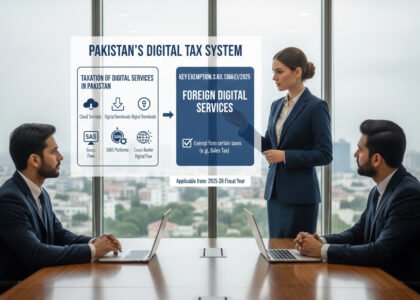The Finance Act 2025 introduces a critical limitation under Section 214A of the Income Tax Ordinance, 2001, which governs the power to condone time limitations. This amendment caps the maximum aggregate extension period to two years and introduces a special exception process via a committee notified by the Federal Board of Revenue (FBR).
This update aims to bring certainty to tax proceedings by restricting indefinite extensions, enhancing taxpayer protection while still allowing flexibility for cases involving major losses or fraud.
Text of the Amendment
In section 214A, in the proviso:
The existing full stop is replaced with a colon (
:).The following new provisos are added:
Proviso 1:
“Provided further that regardless of anything stipulated in this section, or any provision of this Ordinance, or any other applicable law currently in force, and notwithstanding any decision, order or judgment issued by any forum, authority or court, the maximum period of extension under this section by the Board or the Commissioner, as the case may be, shall not exceed two years in aggregate.”
Proviso 2:
“Provided also that where there are reasons to believe that significant loss to exchequer or the taxpayer has been caused by an act of omission or commission by the person or by the Commissioner, a committee of members as notified by the Board may further condone the limitation specified for a period as it may deem fit, after providing a reasonable opportunity of being heard to the person concerned.”
Interpretation and Legal Impact
Two-Year Cap Introduced
FBR and Commissioners can no longer grant indefinite condonation of delay. A hard limit of two years is now imposed, regardless of:
Section 214A wording,
Any other provisions of the Income Tax Ordinance,
Judgments or decisions by tribunals or courts.
Example: If a taxpayer misses the deadline for an appeal or compliance under a tax order, any extension request can now only be entertained within two years from the original deadline.
Exception via FBR-Notified Committee
If substantial loss to taxpayer or government revenue is suspected due to negligence, fraud, or oversight, the Board can empower a committee to:
Review the case,
Condone delay beyond two years, and
Offer the taxpayer a fair hearing.
Purpose of the Amendment
To curb arbitrary extensions by tax officers
To enhance predictability and legal certainty
To ensure serious cases still get fair relief via structured process
FAQs – Section 214A Amendment (Finance Act 2025)
What is Section 214A about?
It gives FBR and Commissioners the power to condone delays in actions required under tax laws.What’s the new limit introduced in 2025?
The maximum extension period is now capped at two years in total.Does this override previous judgments?
Yes. The law clearly overrides any past decisions or orders.Who can extend time under Section 214A?
Only the FBR or Commissioner Inland Revenue, as appropriate.Can time be extended beyond two years?
Only if a committee constituted by FBR approves it under specific conditions.What are the grounds for such further condonation?
Evidence of significant loss to taxpayer or state exchequer due to fraud, negligence, or omission.What protections are available to the taxpayer?
The person must be given a reasonable opportunity of being heard.Can a taxpayer apply for this condonation?
Yes, through proper legal and documentary submission to the FBR or Commissioner.Can the committee’s decision be challenged?
Likely yes—through appeal or constitutional petition, depending on facts.Is this amendment taxpayer-friendly?
It introduces clarity and fairness, but also limits open-ended condonation.Will this apply retrospectively?
It generally applies to requests filed on or after 1st July 2025.What if my delay is over 3 years?
Regular FBR powers cannot help. You’ll need the committee’s approval.What kind of loss justifies further extension?
Tax amount wrongfully paid or lost, fraudulent assessment, or systemic failure.Who appoints the committee?
FBR, through official notification.Is there a time limit for the committee to decide?
Not specified yet—may be governed by Board-issued rules.What documents should accompany a condonation request?
Written application
Proof of delay
Supporting evidence of loss or injustice
Is this related to appeals only?
No. It applies to any act requiring condonation under tax laws.How does this help tax administration?
Prevents delay-based abuse while still offering relief for genuine hardship.Will circulars be issued for clarity?
Likely, as FBR may issue explanatory circulars or SOPs.Can tax consultants help in drafting such applications?
Yes, registered tax professionals can draft legally sound condonation requests.






